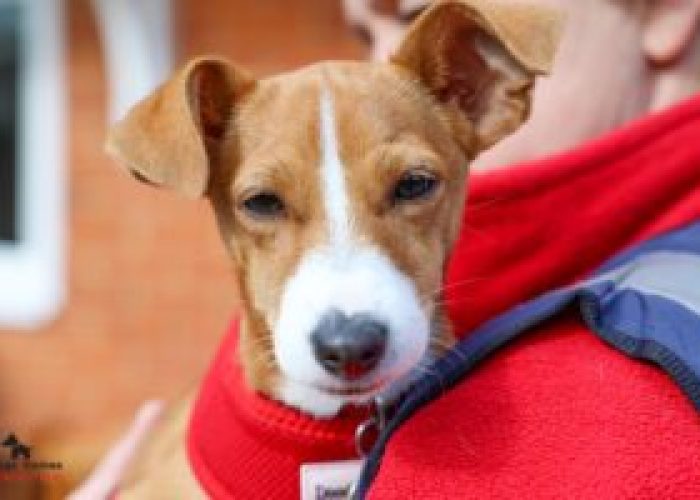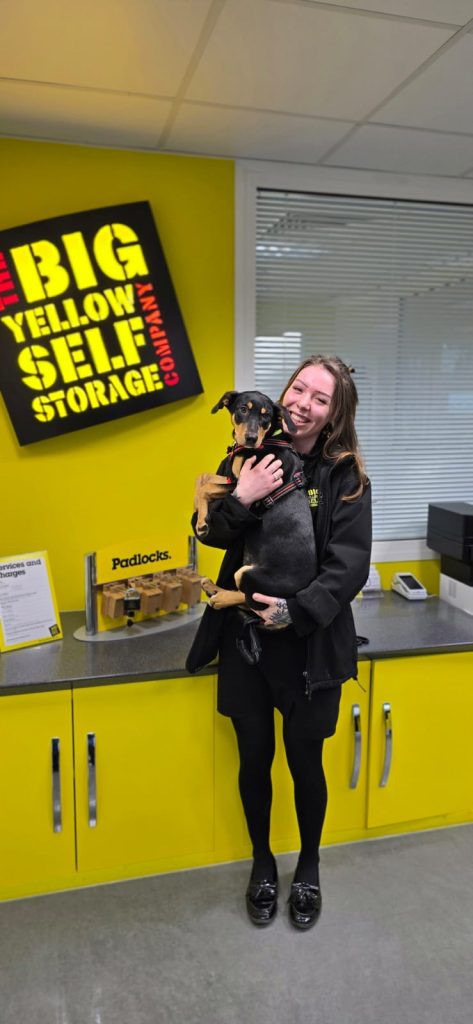You’re getting a puppy! Visions of cute cuddles and perfect playtimes dominate your thoughts, you cannot wait to get your hands on your new furry friend and bring them home to start your lives together.
A new puppy however, is hard work. We know, you’ve heard it a million times, but it can’t really be that demanding, can it?
To help get you in the right mindset so you can seriously consider the impact of a new pup and whether you’re ready to take the plunge, one of our adopters kindly agreed to document their first week with Amy, their 4-month-old Pondenco mix, who came into the care of DogsnHomes after her pregnant mother gave birth shortly after being rescued.
Warts and all, here is how they got on… please remember, this is an individual account of their experience and every dog will be different.
Introduction
My husband and I are in our 70s. Having lost our last rescue dog to old age in 2009, we had enjoyed the freedom that comes with not owning a pet (because, yes, you do have to change the way you live your day-to-day life!) but decided at the beginning of the year that we were ready to expand our family once more and provide a loving home for another rescue pup.
Firstly, we want to get serious. A dog is not a cuddly toy. It is a life, and it’s yours to love and be responsible for the rest of their (or perhaps in our case, our!) days. From previous experience, we know how much joy a dog can bring, but also that they are a commitment, hard work, and permanent. Many compare getting a puppy to having a human baby and we would absolutely agree (think tiredness, being on constant alert during the early days and sometimes questioning what on earth you’ve done?!).
Our set-up
Our home is ideally suited to a dog, with a secure garden and a huge variety of walks nearby. We also knew our highly ordered, well furnished rooms would never be quite so pristine again. While a puppy must learn and respect house rules, it is their home too, so we had to come to a mutual agreement of give and take. It was very important to decide what we minded, and what we would be more relaxed about. For example, we have no problem with a puppy cosying up on a sofa, but do mind being pestered at the table. Deciding on details like this and sticking to consistent rules is vital to send out a consistent message to the dog, teaching them their parameters and setting boundaries helps to create a confident and well-behaved family member.
Are you ALL willing to do your bit?
It is important to work out the family situation. Of course, everyone wants a dog to begin with, but are they all willing to take responsibility and pitch in with the more mundane tasks over the long-term, as well as the walkies and playing. Life will be more restricted, especially in the early days, so is your partner willing to work out their schedule to work with yours in ensuring the dog isn’t left alone for too long, for example?
Amy’s first week
Day 1
Adorable Amy has arrived! A tiny rescue puppy who in her four months of life has already had many changes. She is a bright, lively, inquisitive puppy with a lot of energy. She had been given a loving foster home where her initial training had started, so she responded to her name and ‘sit’. She has eaten well from the start.
We had been warned she might be unsettled at night at first. This made sense as this little puppy has been taken away from everything she knows and placed with us, total strangers at this point. The warning came true. In spite of a warm kitchen, beautiful cosy bed, her favourite toy and one of our garments so she could have our smell as reassurance, she cried. A lot. We felt awful. We stood firm, and she eventually settled.
Day2.
We found Amy in the lounge in the morning, cosy on the sofa… she’d somehow pushed through the dog guard between the carpeted living room and the hard-floored kitchen. There was one poo and a wee on the kitchen floor. Fortunately, she’s a small dog so a quick clean up job, we did not ‘tell her off’ as our research confirmed this is not a positive nor effective way to try and train a dog. Reality was dawning though, what have we taken on? We had a bit of a wobble while we contemplated the permanence of the situation but then had a lovely short walk where we talked to more people than we had in the past six weeks…everyone who saw her loved her. Such joy!
We were wondering how she would get on with going out for a walk without another dog (she had been in foster with a dog) and were thrilled that it didn’t seem to phase her one bit. Had that not been the case though we were fully prepared to let her go at her own pace, not force her to go further than she felt comfortable with or face new and scary situations (it’s only day 2!) such as crossing roads, for example. We took the advice of DogsnHomes and made sure she had a slip lead and a harness, just in case.
Overall a happy day, remaining vigilant for wees and poos and letting her out every half hour or so. She continued to eat well which was wonderful. The cheeky monkey managed to get through the barrier we’d carefully installed (obviously not carefully enough!) to separate the front and the back garden, so we took measures to reinforce.
There was wailing again at night, which was hard to listen to, but not as much as night one.
Day 3.
Poo in lounge (carpeted!), she’d got over the much-reinforced indoor dog guard again – what to do? Our efforts to make the kitchen her night-time room weren’t working. All our careful preparations with barriers were proving inadequate, which was frustrating. Someone had suggested using a crate but we personally are not a fan of them, so we were going to need to have a little re-think. At this point we are feeling really tired too having had disrupted sleep for consecutive nights, which makes things probably more frustrating than they should feel.
Still, a busy and enjoyable day, definitely feel she’s getting to know her home and us, lots of playing, cuddles and snoozing. That night we tried a slightly different tactic, Amy’s Dad settled her into her basket, waited for her to fall asleep and crept away…and we had a quiet night! Result!
Day 4.
Not again! There she was in the lounge in the morning having got through the (even more) reinforced barrier. Time for a major rethink. We decided to put her in the garden room tonight (my pride and joy must be adapted, so a bit sad) which has a door!
The day was great though, fun and busy with necessary naps.
Day 5.
The garden room it is! Great success, a totally quiet night, then straight out in the morning to do her business outside. Very satisfactory, proving you just have to adapt and give them time to settle and learn. Lovely beach walks today and Amy slept from 8pm pretty much through the night.
Day 6.
Another totally quiet night, no pees etc. Straight out to perform. WOW, so rewarding, we feel we’re getting the hang of it.
Amy is gaining in confidence (so are we!), amuses herself well when we are occupied, and is responding well to our basic training attempts. She has clearly been well socialised before she came to us as she loves to meet other dogs and people!
Settled happily into her bed in the garden room and another quiet night.
Day 7.
A small poo and wee on the garden room floor, but our fault for not taking her out last thing last night. Straight into garden where she performed again. Another sunny day with walks and playing. We didn’t want to, but we tried leaving her for 20 mins on her own in the house which she didn’t like much, but didn’t make too much fuss. Little and often we think will do the trick.
So, end of week 1. It’s had its ups and downs, fortunately mostly ups. We are so pleased to have Amy with us, and it feels like she’s been here forever. We are getting used to a more disrupted house(!) and planning our days more carefully.
She is a dear addition to our home.
Final thought
One thing we would mention specifically is not to place too much expectation too soon; when you have a new dog, especially one that hasn’t lived in a permanent domestic scenario, it’s all too easy to forget that what is normal to us is a completely new and sometimes overwhelming situation for them.
We would sometimes find ourselves questioning why Amy wouldn’t do x, y or z and then remember it’s only day 4, she’s only just met us and has no idea what is really going on yet! Time seems to stretch out in your head with a new pup and even though we’d only had her four days, it felt like she’d been with us for weeks (probably because you spend so many hours on them at first!).
Take it slow, try to see things from their perspective and be prepared to adapt; it’s not all plain sailing and is certainly exhausting at first, but totally worth it in our opinion!





